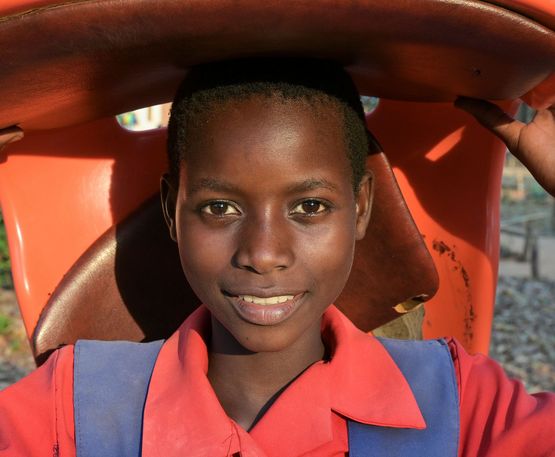
An End to Poverty is Possible
Humanity can overcome poverty and has even committed to doing so in the 2030 Agenda. We have set out on the path, but time is pressing.
Poverty Has Many Faces
A life in dignity includes a healthy diet, adequate housing, health, education and a livelihood. But almost 1.5 billion people lack these secure basic living essentials - they are poor. The United Nations Development Programme describes poverty multidimensionally instead of only in terms of money. Because people are also poor if they cannot use schools or health facilities or have no access to clean water.
“
„We can be the first generation to succeed in eradicating poverty.“
Ban Ki-moon, UN Secretary-General from 2007 to 2016
We can be the first generation to succeed in eradicating poverty.
The Main Causes of Poverty
The causes of poverty are complex and yet have one thing in common: They mostly stem from unjust structures. Those who do not have access to land, water or means of production can quickly fall into poverty. The same applies to people who have no or poorly paid work, or who cannot participate equally in economic life. At the global level, world trade and financial architecture are unfairly structured. Wars and conflicts often arise from structural contradictions in a society and generate poverty and new injustices. And natural disasters often hit the already disadvantaged particularly hard.
But it is not enough to focus only on poverty. The creation and distribution of wealth must also be analysed. The World Bank's calculations show that at the current level of inequality, and assuming growth remains constant, extreme poverty cannot be overcome by 2030. In order to achieve the stated goal of the 2030 Agenda to eradicate extreme poverty by 2030, we must reduce inequality between rich and poor.
Ways Out of Poverty
For poverty reduction, it is essential to introduce social security systems at the national level. This includes elements such as pensions, unemployment insurance, labour market programmes, social assistance, child benefits and universal access to health services and education. The Agenda 2030, in which the countries of the world have committed themselves to the eradication of extreme poverty and hunger, applies at the international level. Enough money has been available for this for a long time. Now all countries must take equal responsibility.
To prevent more money from the countries of the South continuing to flow into the North than is returned through investment, development services or migrant remittances, the international financial system must be better regulated. This means above all closing tax loopholes, strengthening international tax cooperation under the umbrella of the United Nations and finally taxing corporate profits and wealth appropriately.
What Bread for the World Does
To fight poverty and hunger, we promote smallholder agriculture, sustainable farming methods and education, training and health programmes. Together with our partner organisations, we support poor people in overcoming the structural causes of poverty and inequality and in improving political and economic framework conditions. This also includes raising awareness in Germany of the connection between poverty in other parts of the world and our lifestyle, the behaviour of internationally active companies and the international financial architecture.
Unterstützen Sie uns


Hinweis: Die Spendenbeispiele sind symbolisch. Durch Ihre zweckungebundene Spende ermöglichen Sie uns dort zu helfen, wo es am dringendsten ist.
50 € (Spendenbeispiel) Mit 50 € kann z.B. eine Permakultur-Schulung in Malawi finanziert werden. So lernen Familien, wie sie dank Permakultur auch in den Dürre-Perioden frisches Obst und Gemüse ernten können.
100 € (Spendenbeispiel) Mit 100 € können z.B. 50 Spaten für das Anlegen von Gemüsegärten in Burkina Faso gekauft werden. Dort wird vermehrt auf dürreresistentes Saatgut gesetzt, um trotz Klimawandel genug zum Überleben zu haben.
148 € (Spendenbeispiel) Mit 148 € kann z.B. ein Regenwassertank mit 2.000 Liter Fassungsvermögen in Bangladesch gekauft werden. Dort versalzen immer mehr Wirbelstürme die Böden und das Grundwasser, Trinkwasser ist Mangelware.
Hinweis: Die Spendenbeispiele sind symbolisch. Durch Ihre zweckungebundene Spende ermöglichen Sie uns dort zu helfen, wo es am dringendsten ist.
50 € (Spendenbeispiel) Mit 50 € kann z.B. eine Permakultur-Schulung in Malawi finanziert werden. So lernen Familien, wie sie dank Permakultur auch in den Dürre-Perioden frisches Obst und Gemüse ernten können.
100 € (Spendenbeispiel) Mit 100 € können z.B. 50 Spaten für das Anlegen von Gemüsegärten in Burkina Faso gekauft werden. Dort wird vermehrt auf dürreresistentes Saatgut gesetzt, um trotz Klimawandel genug zum Überleben zu haben.
148 € (Spendenbeispiel) Mit 148 € kann z.B. ein Regenwassertank mit 2.000 Liter Fassungsvermögen in Bangladesch gekauft werden. Dort versalzen immer mehr Wirbelstürme die Böden und das Grundwasser, Trinkwasser ist Mangelware.


